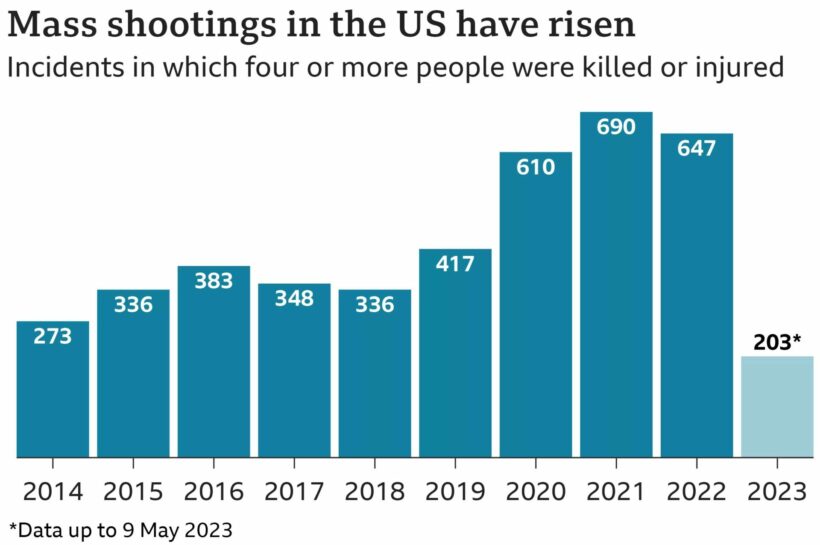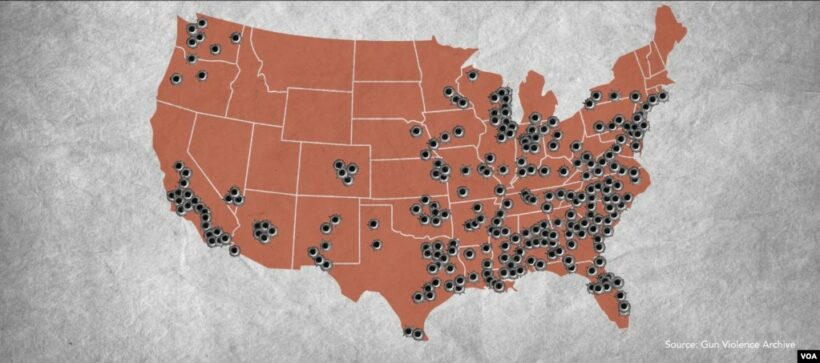Gun violence has once again afflicted the US in several states. More than 17 people were gunned down and dozens injured in a spate during Memorial Day weekend. Chicago, Atlanta, Washington, and New Mexico were among the eight cities where gun violence and other incidents were reported. Beaches, high schools, and motorcycle rallies were the place specifically targeted by the gunmen. More than 200 mass shootings were recorded across the US so far this year, including the attack at a school in Nashville, where three children and three adults were killed, and the mass shooting in Kentucky, where five people were killed.
By Erina Haque
Gun Violence and Mass Shooting

Gun violence is a contemporary global human rights issue. Anyone can be affected by firearm violence worldwide, but the rising trend of gun-related injuries in several states is alarming in the USA. The country is witnessing a surge in gun violence as the gun purchase rate has reached its highest level in 2020 and 2021. Last year, the mass shootings decreased compared to previous years, but it is rising horribly in 2023. Even the number of U.S. kids dying by gunfire keeps rising.
In the last three years, there have been more than 600 mass shootings, almost two a day on average. While the US does not have a single definition for “mass shootings,” the Gun Violence Archive defines a mass shooting as an incident in which four or more people are injured or killed. More than 100 people die every day because of violence committed with firearms. It is not only having lasting impacts on victims and their families but also deteriorating the overall human rights situation in the country.
Gun violence is not stopping just by killing a person or mass shooting; instead, it is becoming a vicious cycle where the growing number of gun violence creates insecurity in peoples’ minds, which result in buying new guns to ensure their safety. The increasing gun suicide rate also reveals the vulnerability inside the country. The availability of guns and other factors contribute to the increasing rate of gun violence.
Why does gun violence in the US need to be stopped?
Among wealthier and developed countries, the USA is an outlier regarding firearm violence. The US government seems to have allowed gun violence to become a human rights crisis. Comprehensive access to firearms and loose regulations lead to more than 40,000 men, women, and children being killed with guns each year in the USA. Due to the gun culture, the USA has top civilian firearms. It now has 120 guns per 100 population, even higher than Yemen, a country currently in one of the worst civil wars of recent times.
Numerous observers claim that the US government’s unilateral activities have brought up new humanitarian problems worldwide. The US government is prioritizing gun ownership over fundamental human rights. This issue is a highly political one, pitting gun control advocates against people who are fiercely protective of their right to bear arms. Despite the vast number of guns in circulation and the sheer number of people killed by guns each year, there is a shocking lack of federal regulations that could save thousands. The governmental bodies in the United States are ignoring the connection between gun violence and the violation of human rights, resulting in more casualties every year.
An estimated 2,000 people are injured by gunshots daily, and at least 2 million people live with firearm injuries around the globe. Among them, the United States has a far greater rate of gun violence than other nations, mainly developed nations. Millions of people suffer the severe and long-term psychological effects of gun violence on individuals, families, and their wider community. While focusing a lot on data, statistics, and ranking, we often forget the tragic stories behind each number. Each life matters, and everyone has a different story.
Given that the right to life is an essential human right, whether the US can effectively curb gun violence should be an important yardstick for the international community to measure its human rights. The US authorities should work more on improving the security situation by taking effective gun control measures before the situation gets out of hand. Besides, they should also establish a victim support mechanism to help the survivors and victims’ families to overcome the grief of losing their loved ones.
Way forward:
US President Joe Biden said that gun violence must be tackled, but repeated shootings indicate that the problem is only worsening. Effectively implemented gun regulation and violence prevention projects can stop the carnage. As a first step, states should recognize firearm violence as a threat to people’s human rights, particularly their rights to life, physical integrity and security of person, and health. For this, strict legislation and enforcement are required. The US administration should concentrate on fixing the situation in its own country first rather than offering counsel or advice to others.
Each year, approximately 40,000 Americans are killed by gunshot wounds, which is roughly equivalent to the annual rate of traffic deaths on American roads and highways. With the murders caused by guns, the accidental deaths caused by guns, and the law-enforcement killings caused by guns, the average comes out to more than 100 Americans killed by bullets every day. The same number of deaths will happen tomorrow, and the day after that, and the day after that, and every day until lawmakers come to their senses and do something about it.
Following this, the US must maximize the protection of human rights, creating the safest possible environment for most people, especially those at the most significant risk. If a state does not exercise adequate control over the possession and use of firearms in the face of persistent gun violence, it could breach its obligations under international human rights law. It is yet to make a very progressive decision regarding stricter laws. So, the US should focus on its domestic condition while promoting the same policy in its human rights and foreign policy.
Erina Haque is a Bangladesh affairs, Sino-Indo-Pak affairs, Myanmar, and Rohingya refugee affairs, an Afghan refugee affairs researcher, and a freelance writer.






